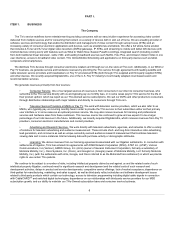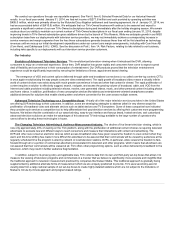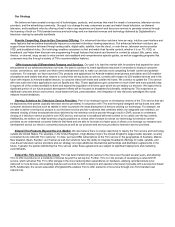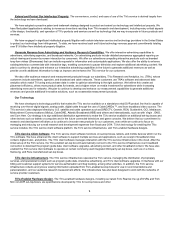TiVo 2013 Annual Report Download - page 17
Download and view the complete annual report
Please find page 17 of the 2013 TiVo annual report below. You can navigate through the pages in the report by either clicking on the pages listed below, or by using the keyword search tool below to find specific information within the annual report.
Table of Contents
Our success and ability to compete are substantially dependent upon our internally developed technology. We rely on patent, trademark
and copyright law, trade secret protection, as well as confidentiality and license agreements with our employees, customers, partners, and
others to protect our intellectual property rights. However, the steps we take to protect our proprietary rights may be inadequate. We have filed
patent applications and provisional patent applications covering much of the unique technology used to deliver the TiVo service and its
features and functionality. To date, several of these patents have been granted, but we cannot assure you that any additional patents will ever
be granted, that any issued patents will protect our intellectual property or that third-parties will not challenge any issued patents. Opposition
proceedings may result in changes to certain claims or revocation of a patent. In addition, other parties may independently develop similar or
competing technologies that design around any patents that may be issued to us. Our failure to secure and protect our proprietary rights could
harm our business.
The cable industry in the United States is currently required to provide access to digital high definition television signals through
CableCARD™ technology. We rely on conditional access security cards supplied by cable operators called CableCARDs for certain types of
our DVRs to receive encrypted digital television signals without a cable operator supplied set-top box. With the limited exception of high
definition over the air broadcast channels, our DVRs presently are limited to using CableCARDs to access digital cable, high definition, and
premium cable channels (such as HBO) that are delivered in a linear fashion where all programs are broadcast to all subscribers all the time.
Our retail cable products are unable to access the encrypted digital television signals of satellite providers such as DIRECTV and Dish as
well as alternative television service providers such as AT&T U-verse and Google Fiber. And without CableCARDs, there presently is no
alternative way for us to sell a retail cable product that works across cable systems nationwide. Furthermore, to the extent more pay TV
customers obtain television service from satellite television providers and alternative television providers such AT&T U-verse and Google
Fiber, the desirability of our retail products and service will be harmed.
On January 15, 2013, the United States Court of Appeals for the D.C. Circuit vacated rules concerning the technical standards for
CableCARDs adopted by the Federal Communications Commission (FCC) in 2003. These rules were part of an FCC order that EchoStar
challenged regarding certain encoding rules applied to satellite operators. EchoStar did not challenge the technical standards for CableCARDs
and the Court did not address any element of the FCC order that applied only to cable systems, cable operators, and cable devices. On July
16, 2013, TiVo filed a Petition for Rulemaking seeking reinstatement by the FCC of the vacated technical standards for CableCARDs. The
National Cable and Telecommunications Association has taken the position that rules adopted by the Federal Communications Commission
in 2010 that, among other things, require cable operators to support and supply CableCARDs to retail devices no longer apply and the
CableCARD rules should not be reinstated. The NCTA has also been seeking legislation to repeal an FCC requirement that cable operators
employ separable security (i.e. CableCARDs) in the set-top boxes they lease to their subscribers.
If cable operators were to cease supporting and providing CableCARDs to consumers without providing TiVo with a commercially viable
alternative method of accessing digital cable, high definition, and premium cable channels that works across cable systems nationwide, we
would be unable to sell most of our current retail products, may be unable to create future retail products, and our business would be harmed
as the market for devices which only receive over the air broadcast television signals is significantly smaller than the current pay TV market.
Certain cable operators are deploying switched digital video technologies to transmit television programs in an on demand fashion
(switched digital) only to subscribers who request to watch a particular program. Although cable operators are deploying a solution to enable
our customers to receive channels delivered with switched technologies (known as the “Tuning Adapter”), if this technology is not successful
or is not adopted by our customers (due to cost, complexity, functionality, or other reasons), then the increased use of switched technologies
and the continued inability of our products to receive switched cable programming without a Tuning Adapter may reduce the desirability and
competitiveness of our products and services and adversely affect sales of our TiVo-Owned subscriptions in which case our business would
be harmed.
Similarly, if cable operators implement new technologies in the future to transmit television programming that do not allow programs to be
received and displayed on our retail products, the desirability and competitiveness of our products and services will be adversely affected and
impact the sales of our TiVo-Owned products and services, in which case our business would be harmed.
16
























